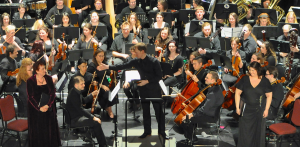Wallowing Around in Mahler – again!
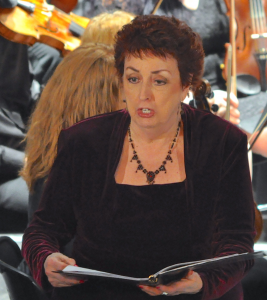
"O Glaube, mein Herz" (Photo by John Herper)
I use this odd term because Mahler has come to mind quite often in the past few months. I have fondly remembered live performances of his glorious music, and sometimes I feel as if I have “over-dosed” in the harmonies and orchestral colors. I never tire of listening to and singing his music.
This will be my third (but hopefully not last) “Mahler Blog”, and will touch on a recent event and a past one. As mentioned in my Mahler Blog of March 24, 2018, on April 19, I performed the mezzo-soprano solos in Mahler’s monumental Symphony No. 2, subtitled “Resurrection”, with the SNHU (Southern New Hampshire University) Orchestra and Chorus. The SNHU forces were joined by the Manchester Choral Society (MCS) and community musicians from other New Hampshire orchestras. My colleague Michelle Trainor was the soprano soloist. This was huge undertaking lead by Rick Cook, head of the SNHU Music Department. I am sure that the young singers and instrumentalists were grateful to be exposed to such a masterwork.
I recently discovered a demo CD that I had made of my performance of another great Mahler work, Das Lied von der Erde (The Song of the Earth), which is a six-movement work for two voices and orchestra totaling about 100 minutes. Traditionally, the six movements are divided, 3 and 3, between a tenor and a mezzo-soprano. Many artists have fiddled with that configuration (for instance, the distinguished baritone Thomas Hampson has performed the “mezzo” movements in concert, and most recently, the tenor Jonas Kaufmann released a recording where he is singing both the tenor AND the mezzo movements. While he is one of my favorite singers, I felt that this was ill advised because the color of his voice, though frequently dark, just didn’t work with movements 2, 4, and 6. To each his own.
The last movement, “Abschied” (Farewell), is about 30 min. long and is a tour-de-force for the mezzo soprano. I mentioned performing this piece in my previous Mahler blogs from earlier this year. I also posted something on FaceBook this past March 31st which, was the 20thanniversary of having performed this piece in Prague with my father-in-law, Milan Vitek, conducting. Here is a portion of that blog.
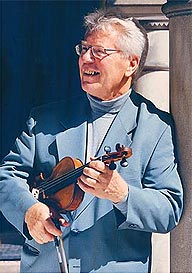
Milan Vitek
In 1998, my father-in-law, Milan Vitek, was asked to guest conduct the Prague Radio Orchestra, and – lucky me – Milan invited me to choose a piece to perform as a guest artist. (I am very excited to see that Milan has a detailed Wikipedia page).
Of course, it was a “no-brainer” – it had to be Mahler. It was between Das Lied von der Erde or the Rückert Lieder. Milan was fine with either choice, so I chose the former. This piece is written for full orchestra and two vocal soloists, a mezzo-soprano and a tenor. A number of artists have “fiddled with” that configuration – for instance, Thomas Hampson has recorded the mezzo movements with tenor Paul Groves, and recently Jonas Kaufmann released a recording where he is singing ALL SIX of the movements. I reserve judgment on that endeavor.
Recorded live in Rudolfinum's Dvorak Hall, Prague, Czech Republic,
Prague Radio Orchestra, March 31, 1998
Janice Edwards, Mezzo-Soprano
Milan Vitek, Conductor
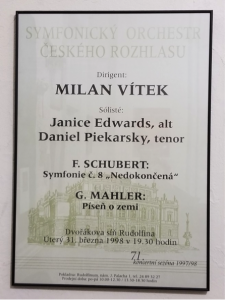
Píseň o zemi (Das Lied von der Erde) poster at the Dvořák Hall, Rudolfinum concert house, March 31, 1998, with tenor Daniel Piekarsky and my father-in-law Milan Vitek conducting
But back to my Das Lied. The less said about the tenor the better, so I will concentrate on my own preparation and performance. We were living in Copenhagen then, and I had about 5 months to prepare the piece. With the help of my teacher at the time, the wonderful Susanna Eken, I worked through the various range issues (from very low to medium high), as well as the nuances of the score. In addition to weekly lessons, I practiced at the piano EVERY DAY – speaking the text in rhythm, singing certain problematic sections over and over – in other words, living with the 3 mezzo movements organically. A work of this complexity and magnitude requires through preparation and study of detail.
I also made a trip to Germany to coach with the famous English contralto, Anna Reynolds.
From Wikipedia:
Anna Reynolds (4 October 1931 – 24 February 2014) was an English classical mezzo-soprano and contralto singer
Dover piano/vocal score of three iconic song cycles. A very useful (and well-worn) volume, and the one I used for Das Lied von der Erde. Curious that “Songs of a Wayfarer”
in opera and concert.
I had met Anna when she made a trip to NYC in the late 1980s, and had a coaching with her on Fricka at the Liederkranz Society, as I had just been cast in that role with Arizona Opera (ww.azopera.org). So when I knew I would be singing Das Lied von der Erde, I contacted Anna about coaching both the Mahler and Wagner pieces and made the trip from Denmark to Germany to spend 4 glorious days with her, having daily coachings.
Here is a YouTube link to Anna’s performance of the mezzo’s first movement, “Der Einsame im Herbst” (The Lonely One in Autumn).
Two of the three mezzo movements (alternating with three movements for the tenor) are slow, sad, reflective. Same for the tenor, which opens the cycle with a Wagner-like, clarion passage (“Das Trinklied vom Jammer der Erde”/The Drinking Song of Earth’s Sorrow). Which lead my colleague George Gray to comment, “Yes, the mezzo has all the glory and the tenor all the pain.”
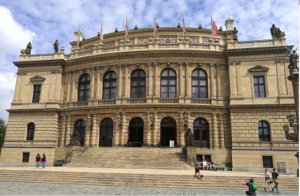
Rudolfinum Concert Hall, Prague (exterior)
When it came time to travel to Prague for Das Lied, I felt thoroughly prepared. It was truly a memorable experience, especially collaborating with my father-in-law. The last movement (“Der Abschied”/The Farewell) is especially heart-wrenching and beautiful – 30 minutes of total concentration, sadness, and redemption. As many of my colleagues can relate, it was an awful lot of work and study for just one performance, but it was oh so worth it. Suffice it to say that this performance totally cemented my love of Mahler and deep appreciation of his genius.
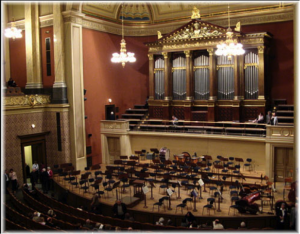
Dvořák Hall, Rudolfinum
Below are some photos of my piano vocal score and the venue in Prague, where Das Lied was performed on March 31, 1998 in the Dvořák Hall of the Rudolfinum.
http://www.classicfm.com/composers/mahler/guides/symphony-no-2-genius/

